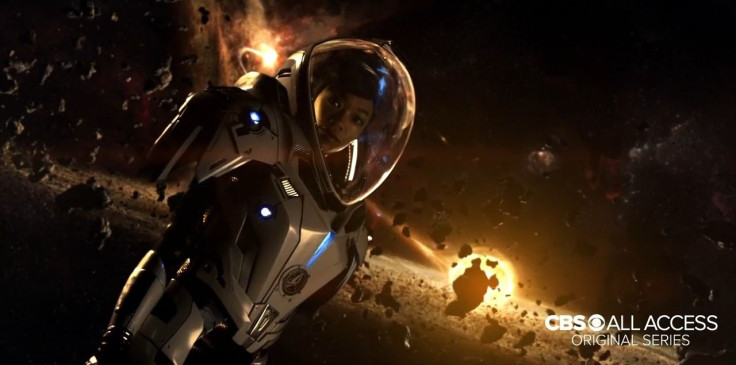In 1971, British blues rock band Ten Years After released their album A Space in Time, off which came their only Top 40 hit, “I’d Love to Change the World.” Cover versions of the song, especially a version by Jetta, have since appeared in trailers for Dawn of the Planet of the Apes, Nightcrawler, Terminator: Genisys and now Star Trek: Discovery.
“I’d love to change the world,” you’ll hear in these trailers, “but I don’t know what to do.” But you won’t hear weightier lyrics like “tax the rich, feed the poor,” “world pollution, there’s no solution” or “just black and white, rich or poor / Them and us, stop the war.” “I’d Love to Change the World” has been stripped of its politics and the specificity of its era’s social upheaval. The countercultural and anti-Vietnam War message has been excised, leaving nothing but an aspirational sentiment and the ongoing uncertainty of exactly what about the world needs changing, or how.
In its bastardized form, “I’d Love to Change the World” is the perfect song for the newly released Star Trek: Discovery trailer, which seems to evince the same emptiness of ideology and thought. For two minutes and 39 seconds, both an ideological song and an ideological show are drained of themselves.
The new Discovery trailer contains a fair amount of dialogue, but they’re words utterly devoid of meaning. “All life is born from chaos,” we’re told. “Sometimes down is up. And sometimes when you’re lost, you’re found,” Commander Michael Burnham (Sonequa Martin-Green) intones, sounding like Mystery Men’s the Sphinx, whose pseudo-wise tautologies infuriate Ben Stiller’s character.
Even the Vulcans get in on this vapid game. “Change is the essential process of all existence,” Sarek says. “You must challenge your preconceptions, or they most certainly will challenge you.”
This is pablum. And so far pablum worthy of corporate motivational posters dominates what we know of Star Trek: Discovery.
Compare Discovery’s “I’d Love to Change the World” attitude to the specific political and moral battles picked by previous Star Trek series. Captain Jean-Luc Picard alone is a font of atheist, socialist and anti-capitalist ideologies:
“Millennia ago they abandoned their belief in the supernatural. Now you are asking me to sabotage that achievement? To send them back into the dark ages of superstition and ignorance and fear? No.”
“A lot has changed in the past 300 years. People are no longer obsessed with the accumulation of things. We’ve eliminated hunger, want, the need for possessions.” Picard concludes: “We’ve grown out of our infancy.”
“The acquisition of wealth is no longer the driving force in our lives.”
Even Star Trek ’s goofier moments are girded with humanist values. A conversation between Ship’s Counselor Deanna Troi and Mark Twain (don’t ask) evinces more anti-imperialist, anti-oligarchy and anti-poverty values than anything we’ve seen or heard from Star Trek: Discovery.
Twain: I know what you say: that this is a vessel of exploration… that’s what the Spaniards said and the Dutch and the Portuguese. It’s what all conquerors say. I’m sure that’s what you told that blue-skinned fellow I just saw, before you brought him here to serve you.
Troi: He’s one of the thousands of species we’ve encountered. We live in a peaceful federation with most of them.
Twain: So there are a privileged few who serve on these ships, living in luxury and wanting for nothing. But what about everybody else? What about the poor? You ignore them.
Troi: Poverty was eliminated on Earth, a long time ago. And a lot of other things disappeared with it: hopelessness, despair, cruelty.
Twain: Young lady, I come from a time when men achieved power and wealth by standing on the backs of the poor. Where prejudice and intolerance are commonplace and power is an end unto itself. And you’re telling me that isn’t how it is anymore?
Troi: That’s right.
Politics have featured more or less prominently in various Star Trek series. Deep Space Nine is concerned with diplomacy, war, terrorism and the way our values can either fail (fuck Section 31) or give us strength in difficult times. Star Trek: The Original Series gave its adventure focus backbone with humanist and anti-racist values. But overall, leftist and humanist values have been central to the soul of Star Trek. So central that a whole cottage industry of conservative rationalizations have popped up to explain how Star Trek isn’t really communist.
So “sometimes when you’re lost, you’re found” doesn’t cut it. Nor does the piffle that tends to come from producers mouths discussing Discovery. “Star Trek is about family,” Akiva Goldsman said at San Diego Comic-Con. Baby food.
“We are also talking about not only war, but something that is really bubbling up in the United States right now, isolationism. Our country has so many different philosophies. Do we extend a hand? Do we shut it down? And that is also two viewpoints that are being expressed,” one of the showrunners, Aaron Harberts, told TrekMovie. What the fuck does that mean? The United States is the extreme opposite of isolationist. A new Star Trek show is coming in an American era of income inequality, belligerent militancy, domestic oppression and both-sides-ism is what’s on offer?
But marketing talk is marketing talk. And producers of network shows know that their every public word will be scrutinized. They want to sell Star Trek to a mass audience. Did anyone (other than me) really expect a Star Trek: Discovery trailer to overflow with Kropotkin anarchism?
There are a scant hints that Star Trek: Discovery may have something more interesting to say. In an interview for TrekMovie, Anthony Rapp, who plays astromycologist Lieutenant Paul Stamets, describes the “real and profound” effect mushrooms have on our lives. Another TrekMovie interview with Shazad Latif describes his character, Lieutenant Ash Tyler, as a traumatized prisoner of war. Could the new Star Trek embrace the magic mushroom, defying the modern war on drugs and offering succor to Starfleet enlistees suffering from depression and anxiety? Could Discovery look PTSD straight-on, bringing a futurist, humanist perspective to the damage militarism brings home?
So far what we’ve seen of Star Trek: Discovery is insipid, safe and stripped of any idea more dangerous than “let’s all learn to get along.” Maybe it doesn’t reflect the show premiering Sept. 24. Maybe it’s just marketing. Maybe.
- Richly redesigned Klingons
- Complex and explicable motives
- Great new Starfleet characters
- Incredible production design
- Generic space combat and action
- Too many flashbacks
- Eschews subtext, doesn't put enough faith in the audience



















![[EG April 19] Best 'Stardew Valley' Mods That Will Change](https://d.player.one/en/full/226012/eg-april-19-best-stardew-valley-mods-that-will-change.png?w=380&h=275&f=955520b8313253ee3c39c791f6210f38)